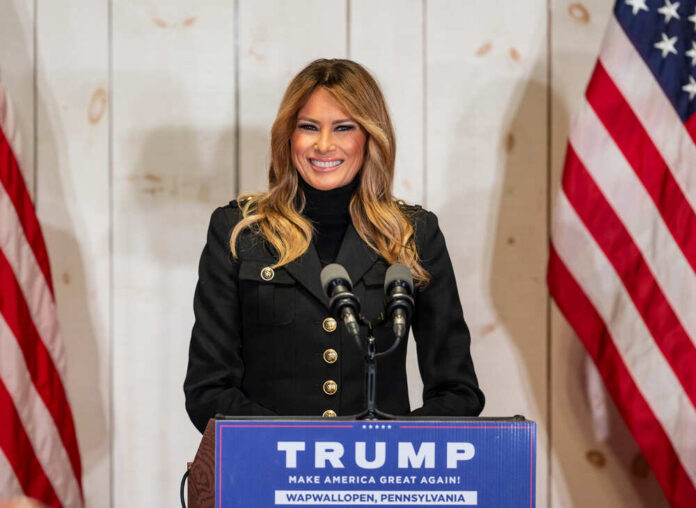
Melania Trump declines White House invitation, citing Mar-a-Lago raid as tensions between political figures intensify.
At a Glance
- Melania Trump rejects Jill Biden’s White House invitation, breaking tradition
- Mar-a-Lago raid cited as reason for declining, highlighting political tensions
- Donald Trump to meet Joe Biden at White House, but Melania’s absence notable
- Melania’s future role as potential first lady remains uncertain
Melania Trump’s White House Snub
In a move that underscores the deep political divisions in Washington, former First Lady Melania Trump has declined an invitation to join her husband, Donald Trump, at the White House. The invitation, extended by President Joe Biden and First Lady Jill Biden, was part of the traditional transition process following a change in administration. Melania’s decision to abstain from this customary meeting has raised eyebrows and fueled discussions about the state of political discourse in America.
The rejection of the White House invitation marks a departure from long-standing protocol. Typically, the outgoing first lady hosts her successor for tea, a tradition that symbolizes the peaceful transfer of power and the continuity of the Office of the First Lady. However, this isn’t the first time Melania Trump has broken with this custom. Following the 2020 election, she did not meet with Jill Biden, setting a precedent for the current situation.
Mar-a-Lago Raid: The Catalyst for Refusal
At the heart of Melania Trump’s decision lies a contentious issue that has dominated headlines: the FBI raid on Mar-a-Lago. In 2022, federal agents searched the Trump family’s Florida residence to recover classified documents allegedly stored there illegally by Donald Trump. This unprecedented action against a former president has become a flashpoint in the ongoing political drama surrounding the Trump administration’s aftermath.
“She ain’t going,” a source familiar with Melania’s decision told The Post. “Jill Biden’s husband authorized the FBI snooping through her underwear drawer. The Bidens are disgusting.”
The raid, described by Melania as an “invasion of privacy,” has clearly left a lasting impact on the former First Lady. In a September interview on “Fox & Friends,” she expressed her anger over the incident, highlighting the personal toll of political actions on public figures and their families.
Uncertain Future for Melania as First Lady
As the political landscape continues to shift, questions arise about Melania Trump’s potential role should her husband return to the White House. Reports suggest that she may adopt a part-time approach to the role of First Lady, possibly not residing full-time at 1600 Pennsylvania Avenue. This unconventional arrangement reflects the unique nature of the Trump presidency and raises questions about the evolving role of the First Lady in modern American politics.
Despite the uncertainty, there are indications that Melania is preparing for a potential return to Washington. She is reportedly working on transition plans and building an East Wing office with the assistance of John Rogers. However, the extent of her involvement and her specific agenda remain unclear, leaving many to speculate about the shape of a possible second Trump administration.
A Reflection of Broader Political Tensions
Melania Trump’s decision to decline the White House invitation is not an isolated incident but rather a symptom of the broader political climate. It mirrors her husband’s actions following the 2020 election when Donald Trump chose not to invite Joe Biden for the traditional Oval Office meeting. These breaks from established norms highlight the deep rifts that continue to divide American politics and society.
As the nation looks ahead to the next election cycle, the actions of political figures and their spouses will continue to be scrutinized for what they reveal about the state of American democracy. The tension between maintaining traditions and expressing political dissent remains a central theme in the ongoing narrative of U.S. politics.
Melania Trump declined to meet with Jill Biden at the White House during Wednesday's meeting between Donald Trump and outgoing President Joe Biden, citing the Mar-a-Lago raid. pic.twitter.com/gHVswSCXQA
— Breaking News (@TheNewsTrending) November 12, 2024














